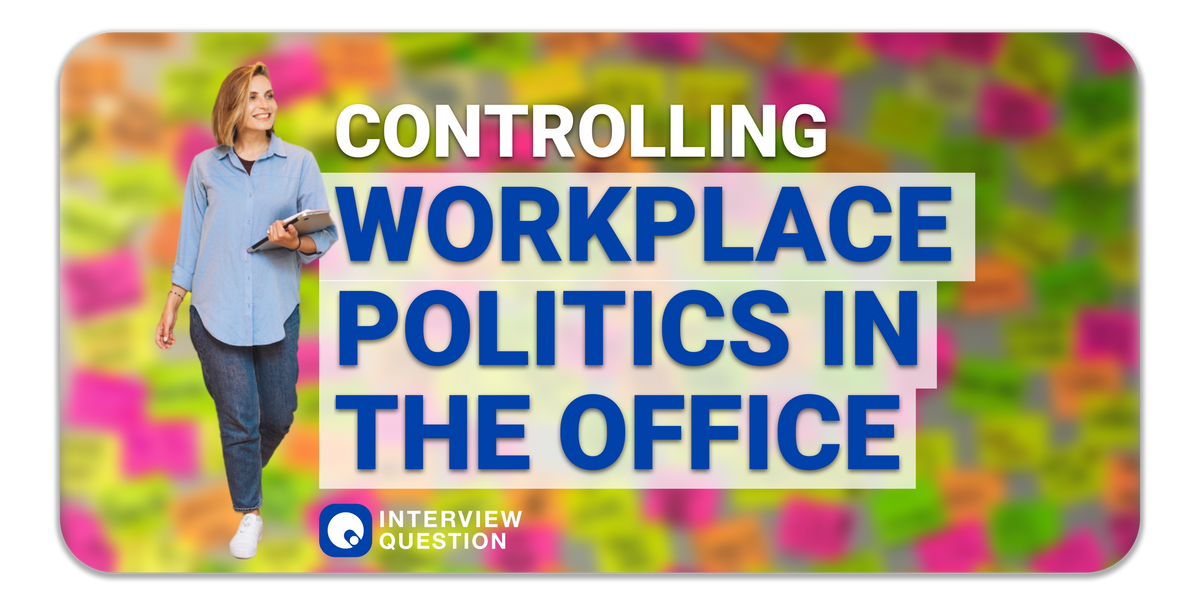Controlling Workplace Politics in the Office
• Informal Social Networks can Help or Harm • Keep Abreast of In-Office Interactions • Control Information Flow • Treat Employees like People • Regain Control With Trust

Workplace politics frankly doesn't need to exist and is often something people are too afraid to confront. However, as managers and owners, we have to interject or lose control of our own workplaces. Taking responsibility for people is a serious responsibility, so we have to make the right decisions regarding our employees and their work environment.
In order to pull off this feat, here are pointers to prepare you for managing workplace politics.

Informal Social Networks can Help or Harm
Even when formal organization hierarchy dictates power and control lines in official capacities, relationships with your staff and each other are much more important and more fluid. It all comes down to the exchange of information.
Informal networks which establish interpersonal relationships are great when it works in the bosses' favor. Some traveling bosses do not have the time to micromanage supervisors. When your employees need to make up for their absence, or when a key person requires the extra time off, a healthy relationship stemming from informal friends at work can be very effective in fixing up sudden problems.

On the other hand, informal relationships can be a big problem when forming networks that focus on maintaining their own power or agenda. These kinds of relationships are always dangerous to the well-being of a company, especially if the boss does not know of its existence. To deal with this, make allies and don't become an easy target. It is important to participate in the company's informal culture and turn it in your favour before you rack up a bad name for yourself (i.e. you earn an unpopular reputation).


Keep Abreast of In-Office Interactions
Politics is not always negative; it can be the glue that keeps the company together and the manager in touch with the employees. Unfortunately, many bosses are generally oblivious to the work-life balance for their employees. They think they can make this up by being there more casually when dealing with employees, but this could be highly detrimental to the company.
Get the latest information fed to you
A well-connected manager can get all sorts of juicy information from the ground without being found out. Watching people's movements and hearing what they are saying from a source within the staff's clique gives you clear ideas of what the company is really like from each employee's point of view.
Hear the political views on the ground. Should you "recruit" loyal followers who can do this information collecting for you and report the info first hand to you, you can make adjustments where needed without being seen as intrusive and destructive to office dynamics. Having updated news reduces a boss' blind spots and weaknesses.
Y0u can get juicy tips on how you can strike out the competition when there is only one spot for promotion as well.

Listen to the rumor mill
Office gossip and unverified rumors hurt feelings. Even if you treat it as a form of "workplace social media," the animosity between workmates weakens the company's image. Employees will build up walls and do anything to avoid getting hurt, which harms the company. People who agree to disagree and share their thoughts can contribute to a better workplace atmosphere.
Keeping tabs on everyone at the office
The best boss is one who knows what their employees are doing when they're off the clock. Management should be aware of who talks to who, who likes who, who has bad blood, etc., without being intrusive or asking probing questions. The quickest way to lose capable, qualified staff is to have them feel uncomfortable in the workplace. They need to be in a mental state where they can be focused on the actual tasks assigned instead of being bothered by the dynamics of power and influence caused by politics.
So, be aware of what's happening in office.
The more you know, the more informed your decisions are. Be a spy plane. Just don't be spotted and deemed a "helicopter parent", a threat or a busybody.

Notice Things That Are Out of Place
As you supervise daily operations, you should keep a lookout for activities and conversations which seem odd. You should notice when something is out of place, then ask questions or suggest changes. When you do interfere, please don't do it loud or big as people will be shocked and have their guard up. With defensive workers, negative emotions like doubt, hesitance, and anger linger. It would be best if you instead approached them in a casual, open, and friendly way.
Control Information Flow
Dealing with politics is easier when you manage your employees' access to information. This goes back to your power and control over the workplace hierarchy, which you can direct or delegate as you wish. Knowledge is power. You are a powerful person under your job title. If not, everyone else will start taking control, making more messes for you to clean up, and regaining their own power. Be manipulative in this regard. Restricting information limits how power-players who play office politics know and the breadth of reach they can impact on. No info simply means smaller-scale politics.

Strengthen People Bonds
Some workplace politics are not just about power or competence but also about emotion. In such a case, the work environment can be so toxic that people don't want to be there and leave. Not unusual. The boss should be aware of this to create an environment where people do want to stay and work. Is there a lack of supervision, some level of distrust, or the opposite? This may involve giving employees trust and showing appreciation to give them a reason to feel proud and accomplished, respectively.
The emotional bonds that bind people together are big players when it comes to politics. Unfortunately, some workers can be swayed by anger, fear, envy, greed, and other negative emotions. Therefore, it is vital to inject positivity so people do not see things through a distorted lens. For example, encourage employees to have better dialogue with their co-workers without being contradictory or bullying. Instead, encourage them to feel happy and excited about the work they do.

Treat Employees like Human-People and Not Slave-Workers
Don't just stick to formalized training programs or talk to people in an uptight way. People don't take it well, and your words are far less believable compared to if you were real and genuine.
Employees are people, and they know in order for them to keep their jobs, the company must "work". Being destructive in the workplace can only work if they know that the company can stand up to the wreckage. Bosses who treat employees like dirt causes employee to think the company is not worth working for. Employees thus end up harming the company when engaging in negative politics to their own end and advantage, at the sake of the company's fate. No one is a winner. Thus, the best manager of a business is one who knows that the company is more valuable than their own political agenda.

Regain Control With Trust
Trust is the crucial component in the work environment. It can make or break people's relationships with their bosses and coworkers, as well as the company's reputation. For example, people who trust their boss to do what is right will be more likely to go along with a plan or proposal, even if it goes against their own personal goals and agenda.
Office politics also thrive when people do not feel that they have the boss's trust, even if they are doing an excellent job or contributing significantly to the company.
As people, we can be our own worst enemy. If people don't trust anyone, they'll only worry about themselves and do things for their own benefit instead of doing what benefits everyone.
Thus, when bosses get their teams on the same page, they achieve organizational alignment—one common goal. Office politics will reduce because people no longer have to worry about what others are doing with their organization's resources. They do not need to fight amongst themselves and internally destroy their own company operations. There is a strong sense of "us" and "me becomes we" when there is trust.
With trust, there is no need for office politics.

Reflection Questions: How Can You Stop Office Politics?
Here are some probing questions you can think about on how to control the politics in your office, including how you can identify them as well as strategies for preventing and responding to them.
- Know your company culture and politics: What are the norms, and how do staff defy them? Why is it so easy to overcome the measures already in place? Consensus; How do people feel about doing their jobs? What kind of scale are we talking about? Is it a culture of competition, or is it collaborative? Are there patterns in how people treat each other?
- Determine what motivates people to be politically aggressive: Is it a promise of promotion, salary growth, or overseas posting? Or do they simply want to be seen as the boss's favorite or to have exclusive access to information? Can there be competitors who are creating internal rife from outside your own company? Then, weed out the spies and traitors.
- Find out your coworkers' political leanings: Figure out where everyone stands politically. What are the political affiliations? Do the strong stick with themselves? Are they cohesive, and do they gel well, or can you easily break them apart by targeting their blind spots? Again, figure out what they want, where they are coming from, and why.
You can discern their political leanings by asking questions like, "do you think we should aim for less political conflict?" and "what are some things that directly benefit your interests?"
If things run out of control, you may need a career coach for advice, opinion and general guidance.


Workplace Violence
Sometimes when organization politics escalate, become heated, and blow out of proportion, fistfights are involved. Stop workplace politics form becoming workplace violence. Violence in the workplace is never the answer.
Giving up political fights where appropriate
One of the keys to controlling workplace politics is knowing when to leave a situation and disengage from an argument. When you sense or feel that things are about to become heated, walk away from the scene and find a distraction - like grabbing some coffee or taking your dog for a walk.
Show of strength is a sign of weakness
When people decide to be violent, it's because they're secretly weak, insecure, or addicted to violence. Because the person is trying to cover up that fear, they'll usually start indirectly using violence in an attempt to hide their true emotions and motivations.

Your Take & Hard Stance on Workplace Politics
As a boss, shift supervisor, deputy interim assistant manager or anyone at work with the slightest bit of leadership tagged to your title, you can stamp out destructive workplace politics conclusively with firm action IF YOU WANT TO.
Recognize that if people are resisting your plans, it's probably because they're afraid of your might, power, and influence. But work has to be done; plans have to proceed on. Sometimes, you are provoked into violence, and you become framed as the instigator (i.e., you "started" it). It's a game, and they're playing it by trying to seem hard and strong. But they're really just trying to cover up their own insecurities. Like we've shared, you can walk away from the situation and revisit it later on. But you might want to keep an eye on them anyway, but you know you can't continue to work that way.
Steps to stop workplace politics once and for all
- First, specify the inappropriate behavior.
- Then, announce that such activity is against company policies and define that you are not going to a personal level to reconcile parties involved. Merely, you are using your professional image and standpoint to resolve the issues of selfish people.
- It is only responsible and right to let them know that you know they're out of control, and you have to put an end to the nonsense by seizing the situation with your authority.
- Tell that you understand that office politics can be a sensitive topic, but they are not in a private workspace, and an average employee does not deserve to be implicated in the mess.
- Otherwise, if this mode of conflict resolution does not close the episode, then don't hesitate to impose disciplinary action to punish those errant workers to end the needless suffering. This is your final avenue for firm action.

